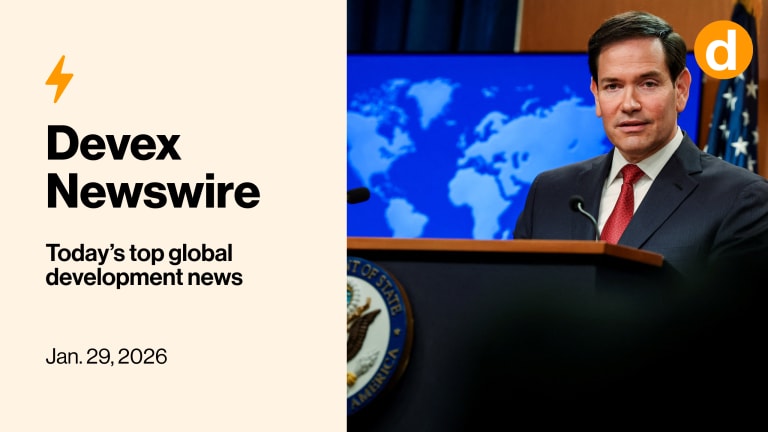
WASHINGTON — U.S. foreign aid did not garner much attention in President Donald Trump’s first State of the Union speech. But after hearing Trump’s brief remarks on assistance spending, development advocates might have preferred if he skipped over the issue entirely.
While few expected Trump to champion major new initiatives in his first such address, they also hoped the president might steer clear of inflicting any more pressure on U.S. global development efforts than his proposals to slash funding already have. Instead the president resurfaced a proposal endorsed by members of the Tea Party to limit U.S. aid to “America’s friends” — presumably countries that vote with the U.S. at the United Nations.
In his speech Tuesday night, Trump called out “dozens of countries” that voted in opposition to his administration’s decision to move the U.S. embassy to Jerusalem and to recognize the contested city as the capital of Israel.
“In 2016, American taxpayers generously sent those same countries more than $20 billion in aid. That is why, tonight, I am asking Congress to pass legislation to help ensure American foreign assistance dollars always serve American interests and only go to friends of America, not enemies of America,” Trump said.
While the president’s request that Congress pass a bill was vaguely worded — he did not specify how Congress should define “friends of America” — the fact that it was prompted by his frustration over U.N. voting makes some experts believe it is possible that is the metric of “friendship” Trump has in mind. If so, he would not be the first U.S. politician to suggest tying U.S. assistance to U.N. voting records.
In 2011 Rep. Louie Gohmert, a Republican from Texas and a member of the conservative Tea Party movement, introduced a bill “to prohibit United States assistance to foreign countries that oppose the position of the United States in the United Nations.” The bill, which never made it to a vote, aimed to cut funding to countries whose U.N. voting positions aligned with the U.S. less than 50 percent of the time during the most recent session of the U.N. General Assembly.
A prior review in 1998 by the conservative Heritage Foundation argued that since many foreign assistance recipients regularly vote against the U.S. at the U.N., foreign aid spending does not support U.S. foreign policy goals abroad. “It seems unlikely that a country would alter its voting habits in the U.N. solely as the result of U.S. foreign aid funding,” the Heritage review concluded.
In fact, as early as 1973, researchers were trying to find links between U.S. foreign assistance and sympathetic U.N. voting. In Foreign Aid and United Nations Votes: A Comparative Study, Eugene Wittkopf from the University of Florida sought to put evidence behind a feeling of “resentment” among lawmakers over the “classic lack of appreciation” among U.S. foreign aid recipients who oppose U.S. positions at the intergovernmental body.
Responding to Trump’s speech on Tuesday, foreign aid advocates pointed out that U.N. voting tallies offer an overly narrow view of “American interests” — as well as American generosity. They rejected Trump’s claim that foreign aid spending must be made to serve American interests.
“American foreign assistance already serves American interests. America’s generosity saves lives, lifts people out of poverty, promotes stability, spurs economic growth, and brings hope to the darkest of places. Our generosity also makes Americans safer, creates American jobs, and moves us closer to the day in which American foreign assistance is no longer needed,” said Tom Hart, North America executive director for the ONE Campaign, in a statement.
“American generosity doesn’t ask if we have voted one way or the other, it saves lives no matter where crises happen. This is why America is a beacon to the world, but a massive cut to America’s poverty-fighting foreign assistance programs — as the President proposed last year and appears ready to do again this year — betrays that legacy,” Hart added.
Trump’s own comments point to how difficult it would be to link foreign assistance with U.N. voting agreement. He noted that countries that opposed his Jerusalem decision received $20 billion in foreign aid in 2016. That is more than half of the foreign aid budget and includes things such as assistance to key Middle Eastern allies Egypt and Jordan, $240 million to fight AIDS in South Africa, and nearly $130 million in humanitarian relief to Somalia.
In total, 128 countries voted to condemn the Trump administration’s announcement.
The president has moved forward with other pledges to cut funding to countries that he deems unfriendly. Earlier this month the president placed a temporary freeze on assistance to Pakistan, a country that receives over $1 billion in annual U.S. assistance, but which the president blamed for providing a “safe haven” for terrorists.
In early January Trump also threatened cuts to the U.N. Relief Works Agency for Palestinian Refugees, which received $369 million from the U.S. in 2016.
“We pay the Palestinians HUNDREDS OF MILLIONS OF DOLLARS a year and get no appreciation or respect,” Trump wrote on Twitter, complaining the Palestinians are “no longer willing to talk peace.”
In response to an inquiry from Devex, a U.S. Agency for International Development official said, “the President is committed to ensuring that American foreign assistance serves American interests. We cannot speculate on possible legislation.”
What's the future of U.S. aid and development policy under the Trump administration? Read Devex news and analysis.
Read more Devex coverage on the future of US aid:
▶ Can USAID use 'transition' metrics to help countries become more self-reliant?
▶ For US aid groups, shutdowns are just one piece of a bigger problem
▶ US aid policy to watch in 2018
▶ MCC CEO nominee would bring political ties, but some question expertise








